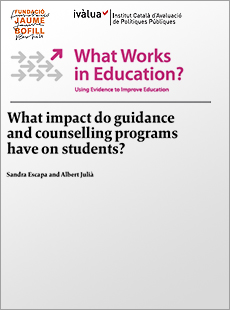Throughout their time in school, students constantly prepare to overcome the different challenges they encounter. They often need some type of support, guidance or counselling to improve conditions for facing both their educational challenges and the decisions that they have to make about their future. In this review of the evidence, we ask to what extent do guidance and counselling programs become tools that improve students’ situations, where do they have an impact (on educational performance, their personal or emotional situations, their relationship with their peer group, self-confidence, etc.) and what characteristics should they have to be as effective as possible.




